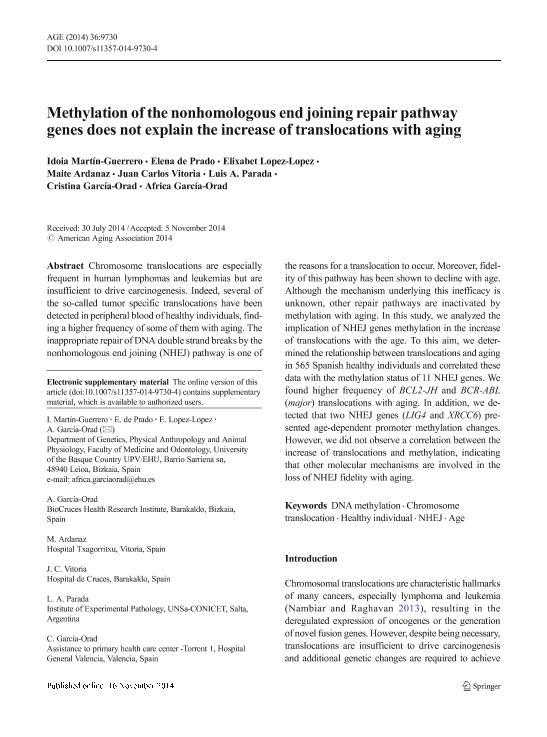Mostrar el registro sencillo del ítem
dc.contributor.author
Martin Guerrero, Idoia
dc.contributor.author
de Prado, Elena
dc.contributor.author
López López, Elixabet
dc.contributor.author
Ardanaz, Maite
dc.contributor.author
Vitoria, Juan Carlos
dc.contributor.author
Parada, Luis Antonio

dc.contributor.author
García Orad, Cristina
dc.contributor.author
García Orad, Africa
dc.date.available
2016-08-18T14:20:04Z
dc.date.issued
2014-11-16
dc.identifier.citation
Martin Guerrero, Idoia; de Prado, Elena; López López, Elixabet; Ardanaz, Maite; Vitoria, Juan Carlos; et al.; Methylation of the nonhomologous end joining repair pathway genes does not explain the increase of translocations with aging; Springer; Age; 36; 6; 16-11-2014
dc.identifier.issn
0161-9152
dc.identifier.uri
http://hdl.handle.net/11336/7233
dc.description.abstract
Chromosome translocations are especially frequent in human lymphomas and leukemias but are insufficient to drive carcinogenesis. Indeed, several of the so-called tumor specific translocations have been detected in peripheral blood of healthy individuals, finding a higher frequency of some of them with aging. The inappropriate repair of DNA double strand breaks by the nonhomologous end joining (NHEJ) pathway is one of the reasons for a translocation to occur. Moreover, fidelity of this pathway has been shown to decline with age. Although the mechanism underlying this inefficacy is unknown, other repair pathways are inactivated by methylation with aging. In this study, we analyzed the implication of NHEJ genes methylation in the increase of translocations with the age. To this aim, we determined the relationship between translocations and aging in 565 Spanish healthy individuals and correlated these data with the methylation status of 11 NHEJ genes. We found higher frequency of BCL2-JH and BCR-ABL (major) translocations with aging. In addition, we detected that two NHEJ genes (LIG4 and XRCC6) presented age-dependent promoter methylation changes. However, we did not observe a correlation between the increase of translocations and methylation, indicating that other molecular mechanisms are involved in the loss of NHEJ fidelity with aging.
dc.format
application/pdf
dc.language.iso
eng
dc.publisher
Springer

dc.rights
info:eu-repo/semantics/openAccess
dc.rights.uri
https://creativecommons.org/licenses/by-nc-sa/2.5/ar/
dc.subject
Dna Methylation
dc.subject
Chromosome Translocation
dc.subject
Age
dc.subject
Nhej
dc.subject.classification
Otras Ciencias Médicas

dc.subject.classification
Otras Ciencias Médicas

dc.subject.classification
CIENCIAS MÉDICAS Y DE LA SALUD

dc.title
Methylation of the nonhomologous end joining repair pathway genes does not explain the increase of translocations with aging
dc.type
info:eu-repo/semantics/article
dc.type
info:ar-repo/semantics/artículo
dc.type
info:eu-repo/semantics/publishedVersion
dc.date.updated
2016-08-04T17:24:17Z
dc.journal.volume
36
dc.journal.number
6
dc.journal.pais
Alemania

dc.journal.ciudad
Berlin
dc.description.fil
Fil: Martin Guerrero, Idoia. Universidad del Pais Vasco; España
dc.description.fil
Fil: de Prado, Elena. Universidad del Pais Vasco; España
dc.description.fil
Fil: López López, Elixabet. Universidad del Pais Vasco; España
dc.description.fil
Fil: Ardanaz, Maite. Hospital Txagorritxu; España
dc.description.fil
Fil: Vitoria, Juan Carlos. Hospital de Cruces; España
dc.description.fil
Fil: Parada, Luis Antonio. Consejo Nacional de Investigaciones Científicas y Técnicas. Centro Científico Tecnológico Salta. Instituto de Patología Experimental; Argentina. Universidad Nacional de Salta; Argentina
dc.description.fil
Fil: García Orad, Cristina. Hospital General Valencia; España
dc.description.fil
Fil: García Orad, Africa. BioCruces Health Research Institute; España. Universidad del Pais Vasco; España
dc.journal.title
Age

dc.relation.alternativeid
info:eu-repo/semantics/altIdentifier/doi/http://dx.doi.org/10.1007/s11357-014-9730-4
dc.relation.alternativeid
info:eu-repo/semantics/altIdentifier/url/http://link.springer.com/article/10.1007%2Fs11357-014-9730-4
Archivos asociados
